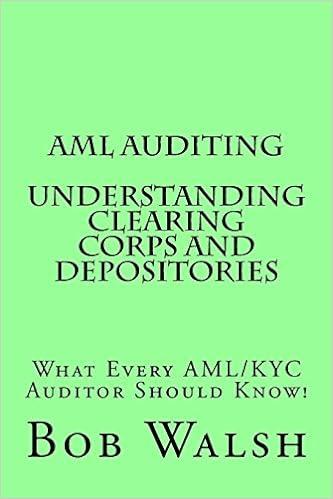Question
1. In confirming with an outside agent, such as a financial institutions, that the agent is holding investment securities in the clients name, an auditor
1. In confirming with an outside agent, such as a financial institutions, that the agent is holding investment securities in the clients name, an auditor most likely gathers evidence in support of managements financial statement assertion of existence and a. Rights and obligations. b. Completeness. c. Presentation and Disclosure. d. Valuation or allocation. 2. A company makes a practice of investing excess short-term cash in marketable securities. A reliable test of the valuation of those securities is a. Comparing cost data with future market quotations. b. Confirming securities held by the broker. c. Comparing carrying value with current market quotations. d. Calculating premium or discount amortization. 3. An auditor has set an audit objective of determining whether planned rate of return on investment in international operations has been achieved. Which of the following audit techniques will best meet this objective? a. Inquiry. b. Inspection of documents. c. Observation. d. Analytical Review. 4. An auditor may conclude that depreciation charges are insufficient if he or she notes a. Insured values greatly in excess of book values. b. Excessive recurring losses on retired assets. c. Large amounts of fully depreciated assets. d. Continuous trade-ins of relatively new assets. 5. The controller of Divine Co., wants to use ratio analysis to identify the possible existence of idle equipment or the possibility that equipment has been disposed of without having written off. Which of the following ratios would best accomplish this objective? a. Depreciation expense divided by book value of manufacturing equipment. b. Gross manufacturing equipment cost divided by units produced. c. Repairs and maintenance cost divided by direct labor costs. d. Accumulated depreciation divided by book value of manufacturing equipment.
6. Which of the following controls is most likely to prevent the improper disposition of equipment? a. Periodically analyzing scrap sales and the repairs and maintenance. b. Using serial numbers to identify equipment that could be sold. c. Separating duties between those authorized to dispose of equipment and those authorized to approve removal work orders. d. Periodically comparing removal work orders with authorizing documentation. 7. In auditing plant assets and accumulated depreciation for proper valuation, the auditor should do all except the following: a. Recalculate depreciation expense on a test basis. b. Vouch major additions by reference to underlying documentation. c. Vouch repairs and maintenance expense on a test basis. d. Physically inspect major plant assets additions. 8. The auditor is least likely to learn of retirements of equipment through which of the following? a. Review of depreciation. b. Review of the purchase returns and allowances account. c. Review of insurance policy riders. d. Analysis of the debits to accumulated depreciation amount. 9. During an audit of a publicly held company, the auditor should obtain written information regarding debenture transactions from the a. Internal auditors b. Clients attorney c. Trustee d. Debenture holders 10. In an audit of a medium-sized manufacturing concern, which one of the following areas can be expected to require the least amount of audit time? a. Revenue b. Assets c. Shareholders equity d. Liabilities
Step by Step Solution
There are 3 Steps involved in it
Step: 1

Get Instant Access to Expert-Tailored Solutions
See step-by-step solutions with expert insights and AI powered tools for academic success
Step: 2

Step: 3

Ace Your Homework with AI
Get the answers you need in no time with our AI-driven, step-by-step assistance
Get Started


